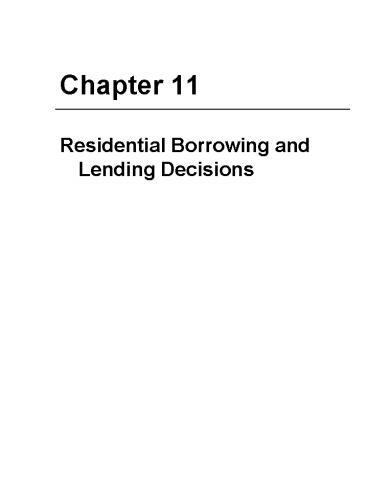Residential Borrowing and Lending Decisions - PowerPoint PPT Presentation
1 / 24
Title:
Residential Borrowing and Lending Decisions
Description:
Rent-buy decisions is analyzed as a net-cash-flow cost issue lowest is best choice ... Amount of mortgage depends on debtor's financial circumstances and ... – PowerPoint PPT presentation
Number of Views:42
Avg rating:3.0/5.0
Title: Residential Borrowing and Lending Decisions
1
Chapter 11
- Residential Borrowing and Lending Decisions
2
The Home Owners Financial Calculus Rational
Financial Decision Making
- Home Ownership Consumption or Investment
Decisions? - Consumption
- Rent-buy decisions is analyzed as a net-cash-flow
cost issue lowest is best choice - Interest and property taxes lower homeowners
income taxes if itemized deductions exceed
standard deduction and adjusted gross income does
not exceed threshold - Tenants costs not tax deductible
- Other homeowner costs include closing costs, down
payment, property maintenance and repairs
3
The Home Owners Financial Calculus Rational
Financial Decision Making
- Home Ownership Consumption or Investment
Decisions? - Investment
- Is the PV of appreciation more than the PV of all
costs for the homeowner? - Up to 500,000 appreciation tax-free for
homeowners
4
How Much Can a Buyer Finance?
- Amount of mortgage depends on debtors financial
circumstances and requirements of lender - Lender requirements
- LTV
- Availability of loan insurance or guarantee
- Housing expense-to-income ratio
- Total-debt-service-to-income ratio
- Debtor capacity
5
How Much Can a Buyer Finance?
- How much should a buyer finance?
- Financial risk
- Incremental interest rates
- Cost of borrowing (effective rate of return)
6
Should a Homeowner Pay Points?
- Point 1 percent of face amount of loan
- Benefit to lender
- Increased yield effective interest rate
7
Should a Homeowner Pay Points? (continued)
- Example without point _at_ 6.5
- PV 150,000
- N 360
- PMT 948.10
- Solve for i
- i 6.5 (.5417 x 12)
8
Should a Homeowner Pay Points? (continued)
- Example with point _at_ 6.25
- PV 148,500
- N 360
- PMT 923.58
- Solve for i
- i 6.35 (.5288 x 12)
9
Should a Homeowner Pay Points? (continued)
- Example with prepayment in 6 years, without point
- PV 150,000
- N 72
- PMT 948.10
- FV 138,098 (balance in 6 yrs)
- Solve for i
- i 6.5 (.5417 x 12)
10
Should a Homeowner Pay Points? (continued)
- Example with prepayment in 6 years, with point
- PV 148,000
- N 72
- PMT 923.58
- FV 137,606 (balance in 6 yrs)
- Solve for i
- i 6.46 (.53825 x 12)
11
Should a Homeowner Pay Points?
- Benefit to Borrower Lower Contract Interest
Rate/Payments - Income Tax Consequences
- Points tax deductible
- If sufficient itemized deductions
- Deductions not reduced because of high income
- Smaller interest payments result in reduced
interest deductions - Assumptions
- Deductibility wont change drastically
- Not different marginal tax bracket or percentage
of itemized deductions to reduce income
12
Should a Homeowner Pay Points?
- Example of after-tax cost of points (home
purchase) - Point paid
- (.01 x 150,000) 1,500
- Less
- Tax deduction (.40 x 1500) 600
- ________
- After-tax cost of paying the point 900
13
Table 11.1
14
Table 11.2
15
Table 11.3
16
Table 11.4
17
Table 11.5
18
The Refinancing Decisions
- Oversimplification
- 200 basis points (2) drop in rate
- 2 2 rule 2 and 2 years
- Longer the duration of mortgage more likely
borrower will benefit from refinance
19
The Refinancing Decisions
- Present value of expected benefits compared to
costs of refinancing - Costs include prepayment penalties, charge for
appraisal and credit reports, origination and
underwriting fees, and closing costs - Benefits include all changes in future cash
flows, same as with payment of points - Lower monthly payments
- Changed equity at payoff
- Increased taxes from lower interest payments
20
Table 11.6
21
Table 11.7
22
Table 11.8
23
Table 11.9
24
The Mortgage Lending Decisions Risk and Return
Trade-Offs
- Subprime and Low-Doc lending
- Subprime higher risk and higher contract
interest rate and/or fees - Low-Doc streamline approval and closing
- Mortgage loans as portfolio assets
- Mismatch of long-term assts (mortgages) and
short-term liabilities (depositor accounts) - Sell loans to secondary mortgage market































